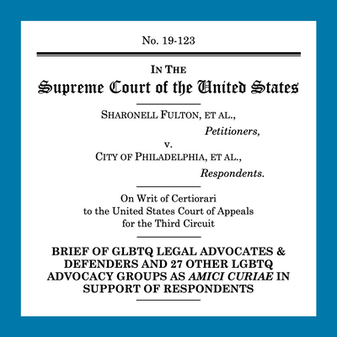Last week NEAT was proud to join the “friend of the court” brief authored by GLBTQ Legal Advocates & Defenders (GLAD) for the upcoming U.S. Supreme Court case Fulton v. City of Philadelphia (see below for more information on the case). The brief clearly outlines the evolution of LGBTQ+ rights in the United States, and points out that the exemption sought by Catholic Social Services would have broad and breathtaking implications. Allowing discrimination against US citizens--even if based on religious beliefs--would be a dark turn for the country. This is especially true when the services in question are funded by taxpayers.
What is Fulton v. City of Philadelphia about?
On November 4, the U.S. Supreme Court will hear a case on whether religious organizations that receive public funds to provide foster services can use their religious beliefs to deny service to LGBTQ+ parents (and potentially others they “disagree” with like single parents, Jews and Catholics). The dispute itself is between the City of Philadelphia and Catholic Social Services, but the outcome will reverberate across the country.
Philadelphia enters into contracts and provides public funds to a variety of agencies to provide foster care services for children in the welfare system. One of the standard clauses in a contract with the city is that a provider must comply with nondiscrimination ordinances adopted by the government. In 2018, Philadelphia learned that two of the agencies they contracted with refused to license same-sex couples to be foster parents claiming it would violate their religious beliefs.
Based on the violation, Philadelphia canceled the contract with Catholic Social Services, who then sued the city. The main contention is that the agency’s constitutional right to religious beliefs has more weight than the municipal nondiscrimination laws. This is one of the many battlegrounds in the evangelical campaign to carve out religious exemptions as a legal way to treat LGBTQ+ people as second class citizens.


 RSS Feed
RSS Feed
